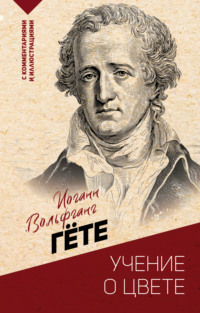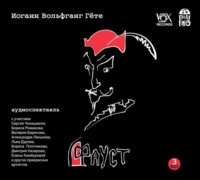 полная версия
полная версияThe Autobiography of Goethe
She had drawn my sketch of the poetic epistle towards her, and read it half aloud in a sweet and graceful manner. "That is very pretty," said she, stopping at a sort of naïve point; "but it is a pity that it is not destined for a real purpose." "That were indeed very desirable," I cried, "and, oh! how happy must he be, who receives from a girl he infinitely loves, such an assurance of her affection." "There is much required for that," she answered; "and yet many things are possible." "For example," I continued, "if any one who knew, prized, honoured, and adored you, laid such a paper before you, what would you do?" I pushed the paper nearer to her, which she had previously pushed back to me. She smiled, reflected for a moment, took the pen, and subscribed her name. I was beside myself with rapture, sprang up, and would have embraced her. "No kissing!" said she, "that is so vulgar; but let us love if we can." I had taken up the paper, and thrust it into my pocket. "No one shall ever get it," said I; "the affair is closed. You have saved me." "Now complete the salvation," she exclaimed, "and hurry off, before the others arrive, and you fall into trouble and embarrassment." I could not tear myself away from her; but she asked me in so kindly a manner, while she took my right hand in both of hers, and lovingly pressed it! The tears stood in my eyes; I thought hers looked moist. I pressed my face upon her hands and hastened away. Never in my life had I found myself in such perplexity.
Juvenile Love.
The first propensities to love in an uncorrupted youth take altogether a spiritual direction. Nature seems to desire that one sex may by the senses perceive goodness and beauty in the other. And thus to me, by the sight of this girl – by my strong inclination for her – a new world of the beautiful and the excellent had arisen. I read my poetical epistle a hundred times through, gazed upon the signature, kissed it, pressed it to my heart, and rejoiced in this amiable confession. But the more my transports increased, the more did it pain me, not to be able to visit her immediately, and to see and converse with her again; for I dreaded the reproofs and importunities of her cousins. The good Pylades, who might have arranged the affair, I could not contrive to meet. The next Sunday, therefore, I set out for Niederrad, where these associates generally used to go, and actually found them there. I was, however, greatly surprised, when, instead of behaving in a cross, distant manner, they came up to me with joyful, countenances. The youngest particularly was very friendly, took me by the hand, and said, "You have lately played us a sorry trick, and we were very angry with you; but your absconding and taking away the poetical epistle has suggested a good thought to us, which otherwise might never have occurred. By way of atonement, you may treat us to-day, and you shall learn at the same time the notion we have, which will certainly give you pleasure." This address put me in no little perplexity; for I had about me only money enough to regale myself and a friend; but to treat a whole company, and especially one which did not always stop at the right time, I was by no means prepared; nay, the proposal astonished me the more, as they had always insisted, in the most honourable manner, that each one should pay only his own share. They smiled at my distress, and the youngest proceeded, "Let us first take a seat in the bower, and then you shall learn more." We sat down, and he said, "When you had taken the love-letter with you, we talked the whole affair over again, and came to a conclusion that we had gratuitously misused your talent to the vexation of others and our own danger, for the sake of a mere paltry love of mischief, when we could have employed it to the advantage of all of us. See, I have here an order for a wedding-poem, as well as for a dirge. The second must be ready immediately, the other can wait a week. Now, if you make these; which is easy for you, you will treat us twice, and we shall long remain your debtors." This proposition pleased me in every respect; for I had already in my childhood looked with a certain envy on the occasional poems,15 of which then several circulated every week, and at respectable marriages especially came to light by the dozen, because I thought I could make such things as well, nay, better than others. Now an opportunity was offered me to show myself, and especially to see myself in print. I did not appear disinclined. They acquainted me with the personal particulars and the position of the family; I went somewhat aside, made my plan, and produced some stanzas. However, when I returned to the company, and the wine was not spared, the poem began to halt, and I could not deliver it that evening. "There is still time till to-morrow evening," they said; "and we will confess to you that the fee which we receive for the dirge is enough to get us another pleasant evening to-morrow. Come to us; for it is but fair that Gretchen too should sup with us, as it was she properly who gave us the notion." My joy was unspeakable. On my way home I had only the remaining stanzas in my head, wrote down the whole before I went to sleep, and the next morning made a very neat fair copy. The day seemed infinitely long to me; and scarcely was it dusk, than I found myself again in the narrow little dwelling beside the dearest of girls.
Gretchen and Her Friends.
The young persons with whom in this way I formed a closer and closer connexion were not properly low, but ordinary sort of people. Their activity was commendable, and I listened to them with pleasure when they spoke of the manifold ways and means by which one could gain a living; above all they loved to tell of people, now very rich, who had begun with nothing. Others to whom they referred had, as poor clerks, rendered themselves indispensable to their employers, and had finally risen to be their sons-in-law: while others had so enlarged and improved a little trade in matches and the like, that they were now prosperous merchants and tradesmen. But above all, to young men, who were active on their feet, the trade of agent and factor, and the undertaking of all sorts of commissions and charges for helpless rich men was, they said, a most profitable means of gaining a livelihood. We all heard this eagerly, and each one fancied himself somebody, when he imagined, at the moment, that there was enough in him, not only to get on in the world, but to acquire an extraordinary fortune. But no one seemed to carry on this conversation more earnestly than Pylades, who at last confessed that he had an extraordinary passion for a girl, and was actually engaged to her. The circumstances of his parents would not allow him to go to universities, but he had endeavoured to acquire a fine handwriting, a knowledge of accounts, and the modern languages, and would now do his best in hopes of attaining that domestic felicity. The cousins praised him for this, although they did not approve of a premature engagement to a girl, and they added, that while forced to acknowledge him to be a fine good fellow, they did not consider him active or enterprising enough to do anything extraordinary. While he, in vindication of himself, circumstantially set forth what he thought himself fit for, and how he was going to begin, the others were also incited, and each one began to tell what he was now able to do, doing, or carrying on, what he had already accomplished, and what he saw immediately before him. The turn at last came to me. I was to set forth my course of life and prospects, and while I was considering, Pylades said, "I make this one proviso, if we all would stand on a level, that he does not bring into the account the external advantages of his position. He should rather tell us a tale how he would proceed if at this moment he were thrown entirely upon his own resources, as we are."
Gretchen, who till this moment, had kept on spinning, rose and seated herself as usual at the end of the table. We had already emptied some bottles, and I began to relate the hypothetical history of my life in the best humour. "First of all, then, I commend myself to you," said I, "that you may continue the custom you have begun to bestow on me. If you gradually procure me the profit of all the occasional poems, and we do not consume them in mere feasting, I shall soon come to something. But then you must not take it ill if I dabble also in your handicraft." Upon this I told them what I had observed in their occupations, and for which I held myself fit at any rate. Each one had previously rated his services in money, and I asked them to assist me also in completing my establishment. Gretchen had listened to all hitherto very attentively, and that in a position which well suited her, whether she chose to hear or to speak. With both hands she clasped her folded arms, and rested them on the edge of the table. Thus she could sit a long while without moving anything but her head, which was never done without occasion or meaning. She had several times put in a word and helped us on over this and that, when we halted in our projects, and then was again still and quiet as usual. I kept her in my eye, and it may readily be supposed that I had not devised and uttered my plan without reference to her. My passion for her gave to what I said such an air of truth and probability, that for a moment I deceived myself, imagined myself as lonely and helpless as my story supposed, and felt extremely happy in the prospect of possessing her. Pylades had closed his confession with marriage, and the question arose among the rest of us, whether our plans went as far as that. "I have not the least doubt on that score," said I, "for properly a wife is necessary to every one of us, in order to preserve at home and enable us to enjoy as a whole what we rake together abroad in such an odd way." I then made a sketch of a wife, such as I wished, and it must have turned out strangely if she had not been a perfect counterpart of Gretchen.
The dirge was consumed; the epithalamium now stood beneficially at hand; I overcame all fear and care, and contrived, as I had many acquaintances, to conceal my actual evening entertainments from my family. To see and to be near the dear girl was soon an indispensable condition of my being. The friends had grown just as accustomed to me, and we were almost daily together, as if it could not be otherwise. Pylades had, in the meantime, introduced his fair one into the house, and this pair passed many an evening with us. They, as bride and bridegroom, though still very much in the bud, did not conceal their tenderness; Gretchen's deportment towards me was only suited to keep me at a distance. She gave her hand to no one, not even to me; she allowed no touch; yet she many times seated herself near me, particularly when I wrote or read aloud, and then laying her arm familiarly upon my shoulder, she looked over the book or paper. If, however, I ventured on a similar freedom towards her, she withdrew, and would not soon return. This position she often repeated, and indeed all her attitudes and motions were very uniform, but always equally fitting, beautiful, and charming. But such a familiarity I never saw her practise towards anybody else.
The Höchst Market-Ship.
One of the most innocent, and at the same time amusing, parties of pleasure in which I engaged with different companies of young people, was this: that we seated ourselves in the Höchst market-ship, observed the strange passengers packed away in it, and bantered and teased, now this one, now that, as pleasure or caprice prompted. At Höchst we got out at the same time as the market-boat from Mentz arrived. At a hotel there was a well-spread table, where the better sort of travellers, coming and going, ate with each other, and then proceeded, each on his way, as both ships returned. Every time, after dining, we sailed up to Frankfort, having, with a very large company, made the cheapest water-excursion that was possible. Once I had undertaken this journey with Gretchen's cousins, when a young man joined us at table in Höchst, who might be a little older than we were. They knew him, and he got himself introduced to me. He had something very pleasing in his manner, though he was not otherwise distinguished. Coming from Mentz, he now went back with us to Frankfort, and conversed with me of everything that related to the internal arrangements of the city, and the public offices and places, on which he seemed to me to be very well informed. When we separated he bade me farewell, and added, that he wished I might think well of him, as he hoped on occasion to avail himself of my recommendation. I did not know what he meant by this, but the cousins enlightened me some days after; they spoke well of him, and asked me to intercede with my grandfather, as a moderate appointment was just now vacant, which this friend would like to obtain. I at first excused myself, because I had never meddled in such affairs; but they went on urging me until I resolved to do it. I had already many times remarked that, in these grants of offices, which unfortunately were often regarded as matters of favour, the mediation of my grandmother or an aunt had not been without effect. I was now so advanced as to arrogate some influence to myself. For that reason, to gratify my friends, who declared themselves under every sort of obligation for such a kindness, I overcame the timidity of a grandchild, and undertook to deliver a written application that was handed in to me.
One Sunday, after dinner, as my grandfather was busy in his garden, all the more because autumn was approaching, and I tried to assist him on every side; I came forward with my request and the petition, after some hesitation. He looked at it, and asked me whether I knew the young man. I told him in general terms what was to be said, and he let the matter rest there. "If he has merit, and moreover good testimonials, I will favour him for your sake and his own." He said no more, and for a long while I heard nothing of the matter.
Gretchen's New Situation.
For some time I had observed that Gretchen span no more, but on the other hand was employed in sewing, and that, too, on very fine work, which surprised me the more, as the days were already shortening, and winter was coming on. I thought no farther about it, only it troubled me that several times I had not found her at home in the morning as formerly, and could not learn, without importunity, whither she had gone. Yet I was destined one day to be surprised in a very odd manner. My sister, who was getting herself ready for a ball, asked me to fetch her some so-called Italian flowers, at a fashionable milliner's. They were made in convents, and were small and pretty; myrtles especially, dwarf-roses, and the like, came out quite beautifully and naturally. I granted her the favour, and went to the shop where I had already often been with her. Hardly had I entered and greeted the proprietress, than I saw sitting in the window a lady, who in a lace cap looked very young and pretty, and in a silk mantilla seemed very well shaped. I could easily recognize that she was an assistant, for she was occupied in fastening a ribbon and feathers upon a hat: The milliner showed me the long box with single flowers of various sorts; I looked them over, and as I made my choice glanced again towards the lady in the window; but how great was my astonishment when I perceived an incredible similarity to Gretchen, nay, was forced to be convinced at last that it was Gretchen herself. No doubt remained, when she winked with her eyes and gave me a sign that I must not betray our acquaintance. I now with my choosing and rejecting drove the milliner into despair more than even a lady could have done. I had, in fact, no choice, for I was excessively confused, and at the same time liked to linger, because it kept me near the girl, whose disguise annoyed me, though in that disguise she appeared to me more enchanting than ever. Finally, the milliner seemed to lose all patience, and with her own hands selected for me a whole bandbox full of flowers, which I was to place before my sister and let her choose for herself. Thus I was, as it were, driven out of the shop, while she sent the box first by one of her girls.
Scarcely had I reached home than my father caused me to be called, and communicated to me that it was now quite certain that the Archduke Joseph would be elected and crowned King of Rome. An event so highly important was not to be expected without preparation, nor allowed to pass with mere gaping and staring. He wished, therefore, he said, to go through with me the election and coronation-diaries of the two last coronations, as well as through the last capitulations of election, in order to remark what new conditions might be added in the present instance. The diaries were opened, and we occupied ourselves with them the whole day till far into the night, while the pretty girl, sometimes in her old house-dress, sometimes in her new costume, ever hovered before me, backwards and forwards among the most august objects of the Holy Roman Empire. This evening it was impossible to see her, and I lay awake through a very restless night. The study of yesterday was the next day zealously resumed, and it was not till towards evening that I found it possible to visit my fair one, whom I met again in her usual house-dress. She smiled when she saw me, but I did not venture to mention anything before the others. When the whole company sat quietly together again, she began and said, "It is unfair that you do not confide to our friend what we have lately resolved upon." She then continued to relate, that after our late conversation, in which the discussion was how any one could get on in the world, something was also said of the way in which a woman could enhance the value of her talent and labour, and advantageously employ her time. The cousins had consequently proposed that she should make an experiment at a milliner's who was just then in want of an assistant. They had, she said, arranged with the woman; she went there so many hours a-day, and was well paid; only when there she was obliged, for propriety's sake, to conform to a certain dress, which, however, she left behind her every time, as it did not at all suit her other modes of life and employment. I was indeed set at rest by this declaration, but it did not quite please me to know that the pretty girl was in a public shop, and at a place where the fashionable world found a convenient resort. But I betrayed nothing, and strove to work off my jealous care in silence. For this the younger cousin did not allow me a long time, as he once more came forward with a proposal for an occasional poem, told me all the personalities, and at once desired me to prepare myself for the invention and disposition of the work. He had already spoken with me several times concerning the proper treatment of such a theme, and as I was voluble in these cases, he readily asked me to explain to him circumstantially what is rhetorical in these things, to give him a notion of the matter, and to make use of my own and others' labours in this kind for examples. The young man had some brains, though he was without a trace of a poetical vein, and now he went so much into particulars, and wished to have such an account of everything, that I gave utterance to the remark: "It seems as if you wanted to encroach upon my trade and steal away my customers!" "I will not deny it," said he, smiling, "as I shall do you no harm by it. This will only continue to the time when you go to the university, and till then you must allow me still to profit something by your society." "Most cordially," I replied, and I encouraged him to draw out a plan, to choose a metre according to the character of his subject, and to do whatever else might seem necessary. He went to work in earnest, but did not succeed. I was in the end compelled to re-write so much of it, that I could more easily and better have written it all from the beginning myself. Yet this teaching and learning, this mutual labour, afforded us good entertainment: Gretchen took part in it and had many a pretty notion, so that we were all pleased, we may indeed say, happy. During the day she worked at the milliner's: in the evenings we generally met together, and our contentment was not even disturbed when at last the commissions for occasional poems began to leave off. Still we felt hurt once, when one of them came back under protest, because it did not suit the party who ordered it. We consoled ourselves, however, as we considered it our very best work, and could therefore declare the other a bad judge. The cousin, who was determined to learn something at any rate, resorted to the expedient of inventing problems, in the solution of which we always found amusement enough, but as they brought in nothing, our little banquets had to be much more frugally managed.
Preparations for the Election.
That great political object, the election and coronation of a King of Rome, was pursued with more and more earnestness. The assembling of the electoral college, originally appointed to take place at Augsburg in the October of 1763, was now transferred to Frankfort, and both at the end of this year and in the beginning of the next, preparations went forward, which should usher in this important business. The beginning was made by a parade never yet seen by us. One of our chancery officials on horseback, escorted by four trumpeters likewise mounted, and surrounded by a guard of infantry, read in a loud clear voice at all the corners of the city, a prolix edict, which announced the forthcoming proceedings, and exhorted the citizens to a becoming deportment suitable to the circumstances. The council was occupied with weighty considerations, and it was not long before the Imperial Quarter-Master, despatched by the Hereditary Grand Marshal, made his appearance, in order to arrange and designate the residences of the ambassadors and their suites, according to the old custom. Our house lay in the Palatine district, and we had to provide for a new but agreeable billetting. The middle story, which Count Thorane had formerly occupied, was given up to a cavalier of the Palatinate, and as Baron von Königsthal, the Nuremberg chargé d'affaires, occupied the upper floor, we were still more crowded than in the time of the French. This served me as a new excuse to be out of doors, and to pass the greater part of the day in the streets, that I might see all that was open to public view.
After the preliminary alteration and arrangement of the rooms in the town-house had seemed to us worth seeing, after the arrival of the ambassadors one after another, and their first solemn ascent in a body, on the 6th of February, had taken place, we admired the coming in of the imperial commissioners, and their ascent also to the Römer, which was made with great pomp. The dignified person of the Prince of Lichtenstein made a good impression; yet connoisseurs maintained that the showy liveries had already been used on another occasion, and that this election and coronation would hardly equal in brilliancy that of Charles the Seventh. We younger folks were content with what was before our eyes; all seemed to us very fine, and much of it perfectly astonishing.
The electoral congress was fixed at last for the 3rd of March. New formalities again set the city in motion, and the alternate visits of ceremony on the part of the ambassadors kept us always on our legs. We were compelled, too, to watch closely, as we were not only to gape about, but to note everything well, in order to give a proper report at home, and even to make out many little memoirs, on which my father and Herr von Königsthal had deliberated, partly for our exercise and partly for their own information. And certainly this was of peculiar advantage to me, as I was enabled very tolerably to keep a living election and coronation-diary, as far as regarded externals.
Baron Von Plotho.
The person who first of all made a durable impression upon me was the chief ambassador from the electorate of Mentz, Baron von Erthal, afterwards Elector. Without having anything striking in his figure, he was always highly pleasing to me in his black gown trimmed with lace. The second ambassador, Baron von Groschlag, was a well-formed man of the world, easy in his exterior, but conducting himself with great decorum. He everywhere produced a very agreeable impression. Prince Esterhazy, the Bohemian envoy, was not tall, though well-formed, lively, and at the same time eminently decorous, without pride or coldness. I had a special liking for him, because he reminded me of Marshal de Broglio. Yet the form and dignity of these excellent persons vanished, in a certain degree, before the prejudice that was entertained in favour of Baron von Plotho, the Brandenburg ambassador. This man, who was distinguished by a certain parsimony, both in his own clothes and in his liveries and equipages, had been greatly renowned from the time of the seven years' war, as a diplomatic hero. At Ratisbon, when the Notary April thought, in the presence of witnesses, to serve him with the declaration of outlawry which had been issued against his king, he had, with the laconic exclamation: "What! you serve: " thrown him, or caused him to be thrown, down stairs. We believed the first, because it pleased us best, and we could readily believe it of the little compact man, with his black, fiery eyes glancing here and there. All eyes were directed towards him, particularly when he alighted. There arose every time a sort of joyous whispering, and but little was wanting to a regular explosion, or a shout of Vivat! Bravo! So high did the king, and all who were devoted to him, body and soul, stand in favour with the crowd, among whom, besides the Frankforters, were Germans from all parts.









